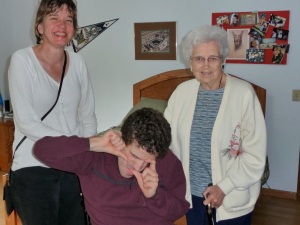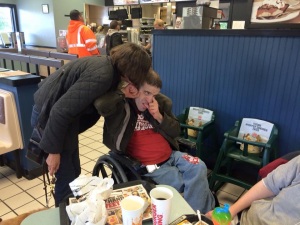Caregivers are not paid what they’re worth
by Beth
November is National Family Caregivers Month, and we’re kicking it off with a guest post by my husband Mike Knezovich.
by Mike Knezovich
Back in 2002, after he turned 16, our son Gus moved to a residence for people with developmental disabilities operated by Bethesda Lutheran Communities. I have a pretty good list of “most difficult times in my life,” as we all do if we live long enough. That time is unsurpassed.
But it was made substantially less difficult by the wonderful human beings we like to call staff, or caregivers, or care providers or some other clinical term. I’ll just leave it at wonderful human beings (WHBs). They communicated with us regularly during the transition, sought and found ways to make Gus feel at home, and eventually, he did. And eventually, we could visit Gus, and not cry our eyes out on the 2-1/2 hour drive home.
Then he had to move again. He had lived in a dormitory style building, which was brand new when he moved there—but the movement toward group homes in community settings had become the flavor of the day. And so, Gus moved with three other fellows into a nice little ranch home across from a nice little park. And we held our breath that it would go OK. It did.
You know why? Those WHBs.
Last month Beth and I met Gus and one of those WHBs at a doctor’s office near where Gus lives. Gus has been having some behavioral issues—nothing we hadn’t seen before, but troublesome because they hadn’t manifested in a long time And so we and the WHB were seeing a doctor about it.
After the appointment, we met Gus and the WHB at Burger King, where our son was treated to two whoppers with cheese and French fries. We took the opportunity to chat with the WHB, learned about how and why she worked with folks like Gus, and generally had a swell time while Gus plowed through his lunch.
A month earlier, I’d attended a meeting of parents and guardians of people who are served by Bethesda. Times are hard—they’re facing cuts and budget issues like everyone.

Beth’s mom Flo got to visit with Gus and us at his little house a few years back–she was 93 at the time.
Here in Illinois, a budget standoff is already taking a toll on everything from literacy programs to health care. Staff are out of work and many of their clients—who were already out of luck—are just out. On their own.
We’ve got something wrong right now. Really wrong. Forget ideology. Just ask yourself: Is there enough money in this country to pay people who care for people like Gus (or people like Beth’s mom at the end of her life, or people like us when we get there) what they’re worth?
On one hand, I’d say no, because what they do is priceless. But we can pay them more. And we can. And that we don’t is on all of us.
As we chatted with the WHB at Burger King, she thanked us profusely for attending the meetings. “When it’s just staff, the doctors don’t take us seriously,” she said.
Having not been taken seriously by a doctor or two in our time, we completely empathized. And before we left, we were sure to say, “No. Thank you.”








November 2nd, 2015 at 11:55 am
You’re right! It is more than a job for these people. That’s what makes them so special.
November 2nd, 2015 at 11:21 am
As far as I am concerned, all of the (caregivers,) CNA’s are underpaid. What they do on a daily basis is not just a salaried job, it’s a vocation. Without an inner mission of helping the disabled and those with dementia, they could not do what they do. It’s a difficult task and they do it with kindness and caring, and always graciously and a smile. Many parents, spouses, and other relatives put loved ones in the hands of Easter Seals, knowing that they can trust this great group to be a secure guardian for the hours that are spent together.But, costs are there, including salaries, and if our government really understood this, a seperate Living wage Ordinance should be enacted to give all health care workers a decent salary.